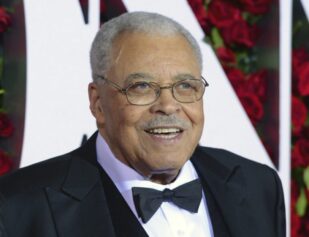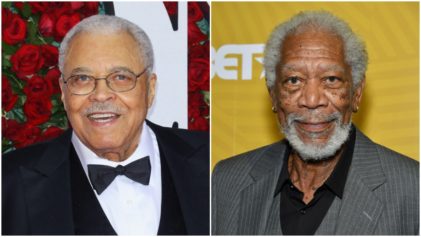James Earl Jones smiled broadly as he recalled the moment, years back, when his young son couldn’t figure out why people were hovering nearby, asking for autographs.
“Poppa,” he asked, “why do you have so many friends?”
Even now, at 81, after a five-decade career in show business, Mr. Jones seems to have more than his share of them. They stare as he and his wife, Cecilia Hart, emerge from a Lincoln Town Car, late for an awards ceremony at Sardi’s restaurant. They joke about his voice, the rumble that made Darth Vader so forbidding. And even before he opens his mouth in “Gore Vidal’s The Best Man” on Broadway, they shower him with applause.
Mr. Jones insists that celebrity holds no allure, and that he has never “hankered” for any particular role. But like it or not, he’s riding the wave that comes with a Tony Award nomination — his first since 2005 — thanks to his performance as the folksy yet tough ex-president, Arthur Hockstader, in the Broadway revival of Mr. Vidal’s political drama.
“The real part of theater is being onstage with your fellow actors,” Mr. Jones had said a few minutes earlier, as the car wove through slow traffic on a rainy afternoon. “The fake part is the glitter of it — that’s got nothing to do with the work of show business. Otherwise, it can do real head tricks — you start believing your publicity.”
He pointed to his wife of 30 years: “She’s how I stay grounded.” They live quietly in Manhattan. The same son who wondered about all those friends, Flynn, is now 29 (“He was conceived on our wedding night,” Mr. Jones said) and works as his father’s assistant.
Mr. Jones won Tonys for “The Great White Hope” in 1969 and “Fences” in 1987 and he’s nominated as lead actor for “The Best Man,” as well. He was at Sardi’s, though, to pick up an Outer Critics Circle prize for outstanding featured actor in a play. (Producers of “The Best Man” had aimed him in the equivalent category for the Tonys too, but the nominating committee ruled his role a lead part.) He sat gamely, grinning when Anne Meara said that the physically imposing Mr. Jones could never be known as “Jimmy.”
“How come I get an award for having fun eight times a week?” Mr. Jones said by way of an acceptance speech, complimenting the critics for their “great insight” in supporting Mr. Vidal’s play, which has been extended through Sept. 9.
In his tiny dressing room at the Gerald Schoenfeld Theater the next day, his jade-colored eyes sleepy (he had been napping) behind wire-rimmed glasses, Mr. Jones said he relished the role because of the intelligence of Mr. Vidal’s writing and because, even for an actor of his stature, meaty parts don’t come easily.
He is open about the changes that come with age. His hearing is not so great; after forgetting his lines one night in 2008 as Big Daddy in “Cat on a Hot Tin Roof” on Broadway, he now keeps a little oxygen machine backstage to keep his lungs oxygenated and his memory sharp. For “Best Man” he takes a bit as needed — “when the words don’t come right away.”
Mr. Jones said he wondered what role his face played in being asked to take the part. “Were they asking me to do it in some kind of tribute to Barack Obama?” he said. Obviously, America had not elected a black president in 1960. “My only response to that is: ‘Why not? Why wasn’t there a black president in the ‘60s?’ ” That is a question that the play should prompt, he said.
Michael Wilson, the director of “The Best Man,” said Mr. Jones’s race — unmentioned in the play — “keeps asking you to flip back between 1960 and now.” Still, he said, the main reason Mr. Jones was cast is because he’s “a great American actor.” And, it turns out, he knits together a cast that includes others veterans, like Angela Lansbury, Candice Bergen and John Larroquette.
“James is our patriarch, just as he is in the play,” Mr. Wilson said. “He set the tone through his abundant curiosity.”
And his good humor. “Some of the mischievous behavior you see in Hockstader, you see in James — he’s a great tease, he’s a flirt,” Mr. Wilson said. “He loves telling dirty jokes with the wardrobe crew. He’ll tease the cleaning woman. It’s his way of creating community.”
Mr. Jones, who grew up on his grandparents’ farm in small-town Michigan, said he connected to Hockstader’s background as “a farm kid from Indiana,” as he put it. “What impressed me is that he is written in the vernacular of a hick,” he said. “He knows it’s not how educated you are, but how smart you are, how cunning you are and how unafraid to use candor and ruthlessness.”
“I love any form of performance,” he continued. “I love any way of expressing ideas through words. It’s probably because I didn’t express myself through words for a long time,” he added, referring to the years between roughly 5 and 14, when, he said, he more or less stopped talking, until drawn into public speaking by a high school English teacher.
“For me, it was just a fear of confronting other human beings,” he said. “I talked quite freely with the animals on the farm.”
One thing he will not talk about is his own politics. While some of his friends suspect that he is a Republican, Mr. Jones said he would remain mum on that score. But he did allow that he expected Mr. Obama to be re-elected.
“Oh, he’ll stay in,” he said. “It’s as it should be.”
After the current triumph, does he have any plans to to give up life onstage and in the spotlight? That possibility was quickly dismissed.
“I’d live an isolated life,” he said.
Source: Nytimes.com

